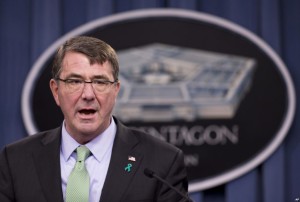By Thomas Lodico
Last Week, Defense Secretary Ashton Carter held a conference on how The United States would deal with the problem of Russian and its intrusion into Ukraine. Secretary Carter mentioned that the United States and NATO forces needed to remain strong on Russia but would need to come up with a balanced plan that both countries could eventually agree on. Carter also noted how Russia might not be as willing to change while Russian President Vladimir Putin is still in charge. While most Democrats and Republicans see that continued fighting with Russia is indeed negative for both countries, neither party has been able to come up with any plan to reconcile these differences.
Secretary Carter’s balanced approach to dealing with Russia highlights an opportunity for more involvement with NATO forces, such as increasing European military presences to combat Russian forces. Russia is seen as a key force in the Iran nuclear deal, which has only had a framework agreed upon. Russia is also a major player in the continuing fight against terrorism in the Middle East, and a key ally in fighting ISIS. With a gameplan set, this deal could have a major impact in pushing back sanctions on Russia, allowing it to recover economically. With Russia recovering economically, more finances will be able to support troops fighting groups in the Middle East.
Carter’s first NATO meeting as defense secretary is to be held this week, and he must show strong leadership in this time of uncertainty by revealing a plan on how The United States and European countries can deal with Russian aggression. Carter acknowledged that economic sanctions are not enough to stop the Russian support of rebels in Ukraine. The main factor in these talks is to get both countries on the same path again and receive Russian support in the fight against terrorism in the Middle East.

